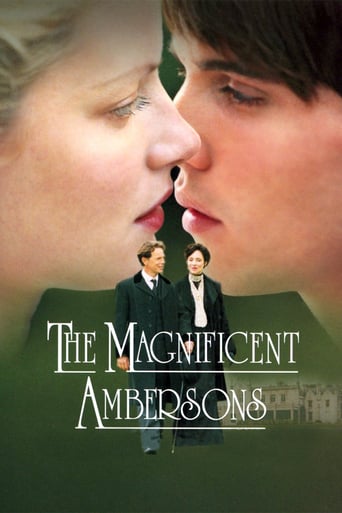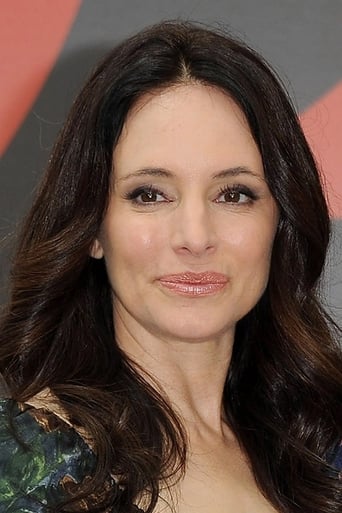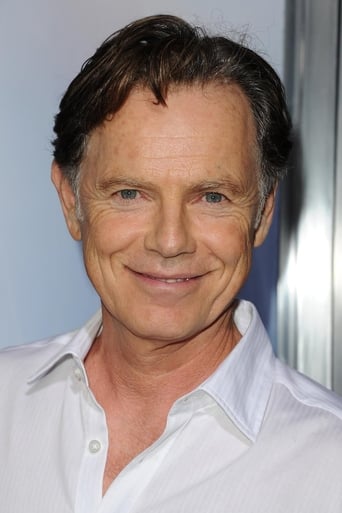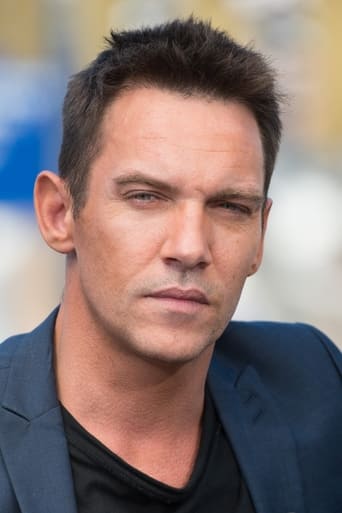

The Magnificent Ambersons (2002)
The spoiled rotten and utterly unlikable rich kid George Amberson becomes horrified when his recently widowed mother rekindles her relationship with the wealthy Eugene Morgan, who she left decades earlier in order to marry George's father. As George struggles to sabotage his mother's new romance, he must deal with his own romantic feelings for Morgan's daughter and the consequences of his meddling as his once great family falls into ruin due to his machinations...
Watch Trailer
Cast


Reviews
Not having read the book, nor having viewed the original Welles version, I watched The Magnificent Ambersons based on it being a period piece. I was also slightly intrigued that it was supposed to be a remake of what is considered a Welles classic. I watched the movie and found it stood well on its own. I was surprised to find it aired in 2002, as it is avant garde in form and has a fresh creativity, and even a daring in its approach that I would expect only of more recent films. The assembled cast is brilliant: Bruce Greenwood is the upbeat, returned prodigal, accompanied by his equally winsome daughter Gretchen Mol; James Cromwell is the patriarch, and Madeline Stowe is the many layered woman torn between her old flame and her ever present love for her son, Jonathan Rhys Meyers. Jennifer Tilly as the spinster aunt adds to the ensemble quite nicely. This was at times painful to watch, since Rhys Meyers's character, George, is so absolutely obnoxious in his arrogance, but this is can be overlooked as George's behavior and personality is what makes the piece tick. Some have criticized Rhys Meyers, yet I found it a very convincing performance. As the uncle put it, "Georgy, I've always been fond of you, but I haven't always liked you." I couldn't stand George, yet there was something that almost made me root from him. A long movie, 150 minutes; however, good acting,creative filming, and a fascinating plot make it worthwhile viewing.
If you are a fan of Orson Welles, I have only one word of advice for you: avoid. This is a truly dire and misguided attempt to 'correct' Welles' masterpiece by including passages from Booth Tarkington's novel to make up for the long lost sequences cut by RKO in the 1940's. What the filmmakers have overlooked, however, is to include modern equivalents for the innovative direction, lighting and great performances that make the original version (even in its forever truncated form) one of the most eminent masterworks in American cinema. Although I will refrain from going into length here about its many shortcomings, the main detraction (even for curiosity's sake) is the (mis)casting of the wooden Jonathan Rhys-Meyers as George Amberson Miniver. No match for the wonderful Tim Holt, Rhys-Meyers pouts and whines his way through the film with seemingly no understanding of what the story is about or is trying to convey. Taking the shallowness and pomp of the character too literally, this vanity performance shows no inner life and, as a result, the character arc is practically nil. For those of you who want some idea of what Welles had originally shown that ungrateful audience in Pamona, track down a copy of Peter Bogdanovich's book-length interview with Orson ('This Is Orson Welles') and refer to the appendix which contains stills and script pages that reconstruct the missing scenes. Beware though, it just might make you cry.
This version appeared on television three years ago, and was supposedly based on Welles' completed script. It got roasted by the television critics (probably unfairly) because it wasn't directed by Welles - lacking his great narration and touches. But it is not a bad film, and it does have a coherence that the other film lacks because of the truncated cutting.The only thing I disagree with is the emphasis on Welles' script. Welles planned to close the film on a down note with Lucy rejecting a crippled George, and Fanny living in a boarding house as the cook. This is not like the television version where an unrepentant, still arrogant George has to be accepted by Eugene as his son-in-law.But it was well acted and directed, and if not as great as Welles' work, it was entertaining and thoughtful. It also explained some of the problems linked to the plot that the truncated version did not go into. For one, why the collapse of the Major's fortune? The Major (John Cromwell) has to sell off his property to support Isabel and George (Madeleine Stowe and Jonathan Rhys - Meyers) on their prolonged trip to Europe. Don't forget, Georgie never had plans for a career, and he is depended on money from grandpa. As Cromwell says, "Does he think I'm made of money?" It also has the real moment of comeuppance that is not found in the Welles' version (in so outwardly a manifestation). George can accept the loss of outward possession, because he knows who he is and what his family was like. But he sees a book on sale in a local bookshop about the first families of Indianapolis. He sees it's expensive, but he buys a copy. He is shocked to find no mention of the Ambersons in the entire book. He is a little less arrogant after that.No, it is not the controversial classic of 1942, but it is - on it's own terms - a worthy film version too.
Let's face it; Orson Welles's movie of The Magnificent Ambersons is a magnificent mess through no fault of its highly regarded director. Cut and edited to pieces by studio hacks (Robert Wise!!!) with the excised material now lost, the movie exists as a mere torso rather than a whole experience. So much is missing, that the movie is hard to follow unless you've read the book. The movie is certainly not what Welles wanted and it is unrepairable; a great tragedy in film history.The new version on A&E may not have Welles's unique directorial ability or atmospheric lighting in black and white, but it does tell Tarkington's story coherently and on the whole, quite successfully. Director Alfonso Arau has purposely avoided the look of the Welles film, opting for a rich, epic color palette. The art direction is beautiful and you really get a flavor of turn of the century midwest American life.Many reviewers have complained of Jonathan Rhys-Meyers performance of George. Frankly it is a brave and quite accurate portrayal. Tim Holt in the Welles film was hopelessly too mature looking to play Tarkington's headstrong brat. Georgie is not a very sympathetic character in the book and Rhys-Meyers studiously avoids turning him into the bland leading man that Welles allowed Holt to portray. Those that take issue with Rhys-Meyers don't know the book. He is the right age and certainly the right look for this difficult character. He is a dynamic actor that isn't afraid to be true to a character's inate nature. He's not easy to take at times, but Georgie isn't either!Many have also criticized Jennifer Tilly's Fanny as not being the equal of Agnes Moorehead. Again, Tilly is closer to the book. Fanny is a hapless character which Tilly invests with a wonderful degree of humanity coupled with her unique brand of eccentricity. Moorehead had not not an ounce of charm and frankly was miscast. Madeleine Stowe, James Cromwell, and Bruce Greenwood are all excellent as are the supporting players.Is this the ultimate version of this classic. Of course not. It is, however, a well made, BBC style television movie that is very true to Tarkington's novel and tells the story clearly, unapologetically and with some amount of panache. I give it an enthusiastic recommendation.




